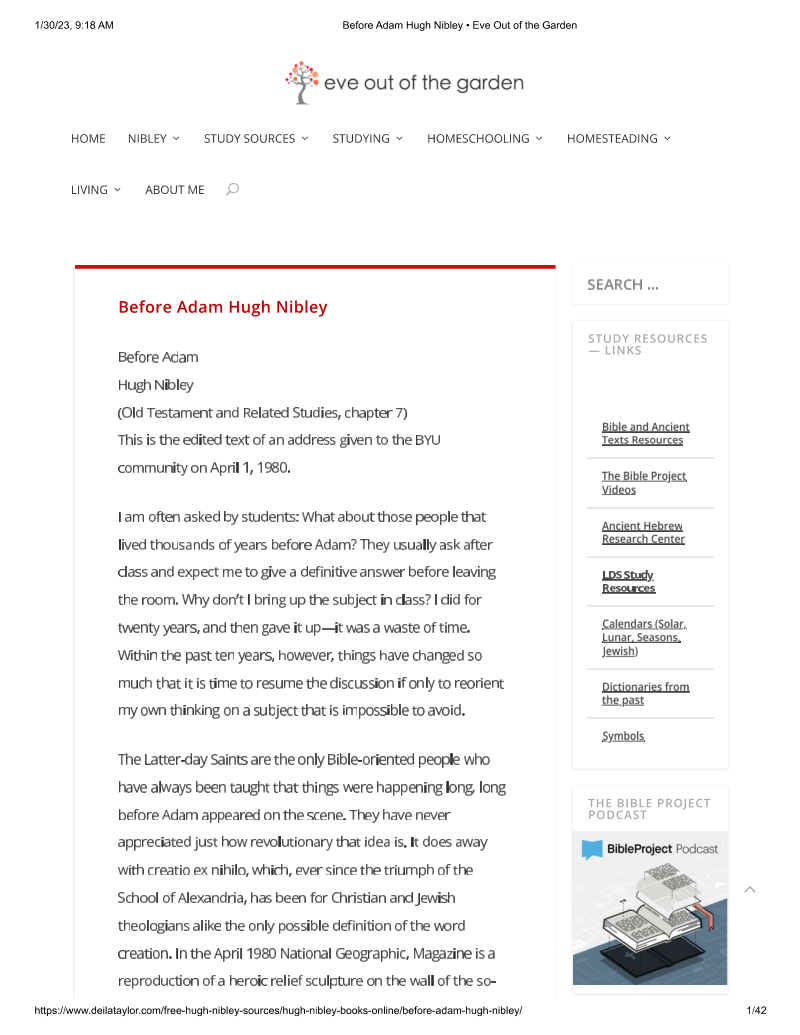Hugh W. Nibley claims that the "root of the Adam-God misunderstanding" is misunderstanding how Adam relates to earthly and heavenly beings.
- Type
- Speech / Court Transcript
- Hearsay
- DirectReprint
- Reference
Hugh W. Nibley, "Before Adam," address given to the BYU community, April 1, 1980, deilataylor.com, accessed January 30, 2023
- Scribe/Publisher
- deilataylor.com
- Audience
- Reading Public
- Transcription
One of those innumerable hypotheses that Professor Campbell mentions, now released for serious discussion by recent discoveries, is that human life may have been transplanted directly from some other planet. Speculating on the subject, we have the romantic Carl Sagan; Leslie E. Orgel of the Salk Institute; Francis H. C. Crick, a Nobel laureate; and others. One eminent scientist, Albert Rosenfeld, confesses, “I’m somehow not surprised at the idea that someone out there put us here. And if such a magical, mysterious, and powerful intelligence exists that is utterly beyond human imagining, can you give me a good reason why I shouldn’t call it God?”
Which takes us back to the issue with which the Adam question began and which has always been the central issue of human paleontology: a matter of definitions. They may seem trivial, secondary, naïve—but the experts have never been able to get away from it. Evolution and natural selection were never defined to Darwin’s satisfaction. Today all the specialists are trying to agree on a clear definition for man: when is a homo a homo, and how much? And one of our biggest stumbling blocks is not knowing how Adam relates to other beings, earthly and heavenly. That is the root of the Adam-God misunderstanding. (Until we care to look into the matter seriously, I will keep my opinions in a low profile.)
Do not begrudge existence to creatures that looked like men long, long ago, nor deny them a place in God’s affection or even a right to exaltation—for our scriptures allow them such. Nor am I overly concerned as to just when they might have lived, for their world is not our world. They have all gone away long before our people ever appeared. God assigned them their proper times and functions, as he has given me mine—a full-time job that admonishes me to remember his words to the overly eager Moses: “For mine own purpose have I made these things. Here is wisdom and it remaineth in me.” (Moses 1:31.) It is Adam as my own parent who concerns me. When he walks onto the stage, then and only then the play begins. He opens a book and starts calling out names. They are the sons of Adam, who also qualify as sons of God, Adam himself being a son of God. This is the book of remembrance from which many have been blotted out. They have fallen away, refused to choose God as their father, and by so doing were registered in Satan’s camp. “Satan shall be their father, and misery shall be their doom.” (Moses 7:37.) Can we call them sons of Adam, bene-Adam, human beings proper? The representative Egyptians, Babylonians, Greeks, and Romans, to name only the classic civilizations of old, each fancied themselves to be beings of a higher nature, nearer to gods than others who inhabited the land with them (and before them), or who dwelt in other lands. And yet they did not deny humanity to them.
Adam becomes Adam, a hominid becomes a man, when he starts keeping a record. What kind of record? A record of his ancestors—the family line that sets him off from all other creatures. Such records begin very early, to judge by the fabulous genealogic knowledge of the Australian aborigines (A. P. Elkin) or the most “primiitive” Africans (L. Frobenius). Even written records go back to ages lost in the mists of time—the Azilian pebbles, the marking of arrows, and the identity of individuals in their relationships with each other.48 Whether former speculation about life on other worlds is now to be upgraded to life from other worlds remains to be seen, but Adam is wonderful enough without that. That gap between the record keeper and all the other creatures we know anything about is so unimaginably enormous and yet so neat and abrupt that we can only be dealing with another sort of being, a quantum leap from one world to another. Here is something not derivative from anything that has gone before on the local scene, even though they all share the same atoms.
- Citations in Mormonr Qnas
The B. H. Roberts Foundation is not owned by, operated by, or affiliated with the Church of Jesus Christ of Latter-day Saints.

